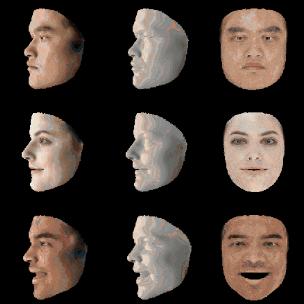Search Results for author: Eric R. Chan
Found 10 papers, 4 papers with code
Single-Shot Implicit Morphable Faces with Consistent Texture Parameterization
no code implementations • 4 May 2023 • Connor Z. Lin, Koki Nagano, Jan Kautz, Eric R. Chan, Umar Iqbal, Leonidas Guibas, Gordon Wetzstein, Sameh Khamis
To tackle this problem, we propose a novel method for constructing implicit 3D morphable face models that are both generalizable and intuitive for editing.
Real-Time Radiance Fields for Single-Image Portrait View Synthesis
no code implementations • 3 May 2023 • Alex Trevithick, Matthew Chan, Michael Stengel, Eric R. Chan, Chao Liu, Zhiding Yu, Sameh Khamis, Manmohan Chandraker, Ravi Ramamoorthi, Koki Nagano
We present a one-shot method to infer and render a photorealistic 3D representation from a single unposed image (e. g., face portrait) in real-time.
Generative Novel View Synthesis with 3D-Aware Diffusion Models
no code implementations • ICCV 2023 • Eric R. Chan, Koki Nagano, Matthew A. Chan, Alexander W. Bergman, Jeong Joon Park, Axel Levy, Miika Aittala, Shalini De Mello, Tero Karras, Gordon Wetzstein
We present a diffusion-based model for 3D-aware generative novel view synthesis from as few as a single input image.
Diffusion in the Dark: A Diffusion Model for Low-Light Text Recognition
no code implementations • 7 Mar 2023 • Cindy M. Nguyen, Eric R. Chan, Alexander W. Bergman, Gordon Wetzstein
Capturing images is a key part of automation for high-level tasks such as scene text recognition.
Generative Neural Articulated Radiance Fields
no code implementations • 28 Jun 2022 • Alexander W. Bergman, Petr Kellnhofer, Wang Yifan, Eric R. Chan, David B. Lindell, Gordon Wetzstein
Unsupervised learning of 3D-aware generative adversarial networks (GANs) using only collections of single-view 2D photographs has very recently made much progress.
3D GAN Inversion for Controllable Portrait Image Animation
no code implementations • 25 Mar 2022 • Connor Z. Lin, David B. Lindell, Eric R. Chan, Gordon Wetzstein
Portrait image animation enables the post-capture adjustment of these attributes from a single image while maintaining a photorealistic reconstruction of the subject's likeness or identity.
Efficient Geometry-aware 3D Generative Adversarial Networks
2 code implementations • CVPR 2022 • Eric R. Chan, Connor Z. Lin, Matthew A. Chan, Koki Nagano, Boxiao Pan, Shalini De Mello, Orazio Gallo, Leonidas Guibas, Jonathan Tremblay, Sameh Khamis, Tero Karras, Gordon Wetzstein
Unsupervised generation of high-quality multi-view-consistent images and 3D shapes using only collections of single-view 2D photographs has been a long-standing challenge.
ACORN: Adaptive Coordinate Networks for Neural Scene Representation
1 code implementation • 6 May 2021 • Julien N. P. Martel, David B. Lindell, Connor Z. Lin, Eric R. Chan, Marco Monteiro, Gordon Wetzstein
Here, we introduce a new hybrid implicit-explicit network architecture and training strategy that adaptively allocates resources during training and inference based on the local complexity of a signal of interest.
pi-GAN: Periodic Implicit Generative Adversarial Networks for 3D-Aware Image Synthesis
3 code implementations • CVPR 2021 • Eric R. Chan, Marco Monteiro, Petr Kellnhofer, Jiajun Wu, Gordon Wetzstein
We have witnessed rapid progress on 3D-aware image synthesis, leveraging recent advances in generative visual models and neural rendering.
 Ranked #3 on
Scene Generation
on VizDoom
Ranked #3 on
Scene Generation
on VizDoom
MetaSDF: Meta-learning Signed Distance Functions
2 code implementations • NeurIPS 2020 • Vincent Sitzmann, Eric R. Chan, Richard Tucker, Noah Snavely, Gordon Wetzstein
Neural implicit shape representations are an emerging paradigm that offers many potential benefits over conventional discrete representations, including memory efficiency at a high spatial resolution.






